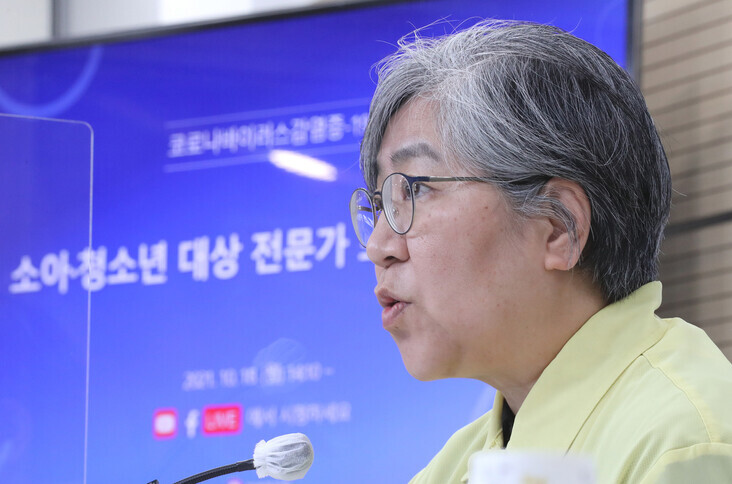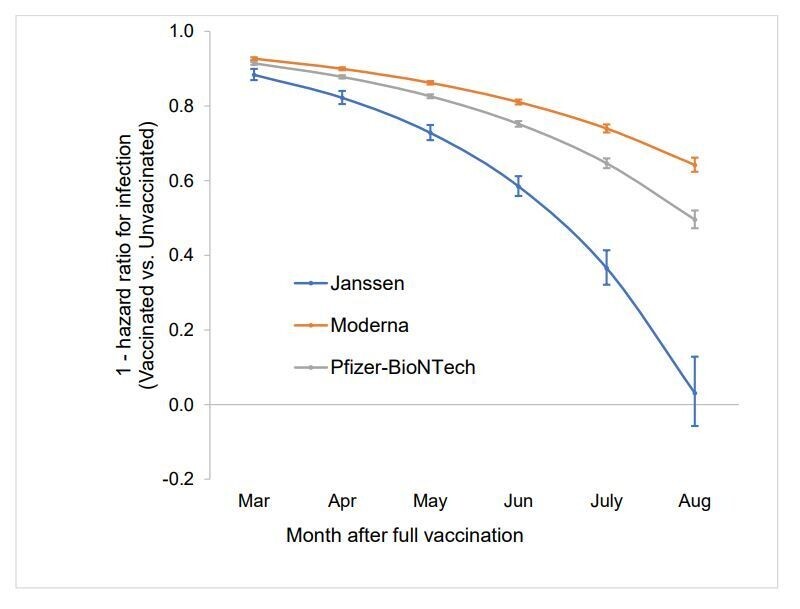hankyoreh
Links to other country sites 다른 나라 사이트 링크
Janssen booster shots likely to be moved up amid revelations of plummeting effectiveness

Research findings showing that the prevention effects of the COVID-19 vaccine developed by Janssen decrease sharply over time have increased the likelihood that the South Korean government will move up its timeline for administering booster shots to recipients from its original schedule in December.
“We have also been analyzing how much neutralizing antibodies [protecting cells against viruses] rise and fall in a sample of 100 to 200 people who received the Janssen vaccine,” Korea Disease Control and Prevention Agency (KDCA) Commissioner Jeong Eun-kyeong said in a briefing Monday afternoon.
“We’ve conducted analyses of vaccination effects and how many breakthrough infections have occurred,” she explained.
“We’ve been analyzing the [vaccine mixing] recommendations of the US Food and Drug Administration’s [Vaccines and Related Biological Products] Advisory Committee and the results of mixed vaccine administration shared by the US Centers for Disease Control and Prevention, and we plan on holding a vaccination expert committee meeting next week before announcing our decision on a plan for additional administration for the Janssen vaccine,” she added.
While Jeong did not give an exact date, the booster shot administrations appear likely to happen in November.
During a Blue House advisors’ meeting the same morning, President Moon Jae-in remarked on research findings showing a sharp drop in the Janssen vaccine’s effectiveness over time, ordering the “swift development of plans for booster shot administration to Janssen vaccine recipients.”
The FDA’s Vaccines and Related Biological Products Advisory Committee (VRBPAC) recommended the administration of booster shots to Janssen vaccine recipients at least two months after they received their original dose.
“Once we start our gradual return to everyday life, that increases the risk of infection, which raises the need for booster shot administration,” said Jung Jae-hun, a professor of preventive medicine at Gachon University.
“The US is recommending booster shots [for Janssen vaccine recipients] starting two months after administration, and it’s very likely that South Korea will also be proceeding with that as swiftly as possible,” he added.
But even if the booster shot plan is announced next week and reservations are taken, the process will take around two weeks, which means the additional vaccines will not actually be administered until November.
Experts say that if booster shots are given to Janssen vaccine recipients, the plan will need to be organized carefully to avoid creating confusion with other vaccine administration plans.
“Even if we lower the [Janssen] booster shot [interval] to five months, we will need a standard,” said Eom Joong-sik, a professor of infectious disease at Gachon University Gil Medical Center.
“We need to manage things so that the people who were vaccinated first can receive [booster shots] in order,” he said.
“If we don’t establish standards, we could end up straining the overall vaccine administration system with things like a temporary shutdown of the reservation server,” he warned.

The South Korean government had originally planned to review booster shots for Janssen vaccine recipients while developing its booster shot administration plan for the entire South Korean population before December.
In a briefing on Wednesday, Hong Jeong-ik, head of the vaccination management team for the vaccine response task force, said, “Janssen vaccine administration began in June in South Korea’s case, and the booster shot period would begin in December.”
“We will be finalizing and announcing a detailed implementation plan for the Janssen vaccine before December based on reviews by expert advisors and the vaccination expert committee,” he predicted.
Recent findings from the US indicate that vaccine prevention effects have been significantly lower in Janssen vaccine recipients than in those who received other vaccines.
On Thursday, Barbara Cohn and other researchers with the Public Health Institute in the US published findings on the medical manuscript site medRxiv from an analysis of 620,000 discharged soldiers who had received different vaccines. The results showed a much larger drop in effectiveness for the Janssen COVID-19 vaccine than for the Moderna or Pfizer vaccines.
For those who received the one-shot Janssen dose, the prevention effect fell from 88% in March to just 3% five months later in August. Over the same period, effectiveness fell from 92% to 64% for those fully inoculated with the Moderna vaccine, and from 91% to 50% for those fully inoculated with the Pfizer vaccine.
As soon as the findings were released, VRBPAC experts unanimously recommended that the FDA to approve booster shot administration to Janssen vaccine recipients.
The US CDC’s Advisory Committee on Immunization Practices plans to hold discussions on Wednesday and Thursday over whether to recommend booster shots for the Janssen and Modern vaccines. A decision on booster shots is very likely to be made at that meeting.
The decline in the Janssen vaccine’s effectiveness has already been observed in South Korea, with more breakthrough infections reported in Janssen vaccine recipients than in those who received other vaccines.
As of Oct. 3, the breakthrough infection rate in Janssen vaccine recipients stood at 0.216% — substantially higher than the rates for the Pfizer vaccine (0.043%), the AstraZeneca vaccine (0.068%), or the Moderna vaccine (0.005%).
As of the start of the day Sunday, a total of 1,469,239 South Korean residents had received the vaccine developed by Johnson & Johnson-owned Janssen, representing 4.4% of the 33,185,615 people who were fully vaccinated at the time.
By Lee Jae-ho, Kim Ji-hoon, and Lee Wan; staff reporters
Please direct questions or comments to [english@hani.co.kr]

Editorial・opinion
![[Column] Season 2 of special prosecutor probe may be coming to Korea soon [Column] Season 2 of special prosecutor probe may be coming to Korea soon](https://flexible.img.hani.co.kr/flexible/normal/500/300/imgdb/original/2024/0426/3317141030699447.jpg) [Column] Season 2 of special prosecutor probe may be coming to Korea soon
[Column] Season 2 of special prosecutor probe may be coming to Korea soon![[Column] Park Geun-hye déjà vu in Yoon Suk-yeol [Column] Park Geun-hye déjà vu in Yoon Suk-yeol](https://flexible.img.hani.co.kr/flexible/normal/500/300/imgdb/original/2024/0424/651713945113788.jpg) [Column] Park Geun-hye déjà vu in Yoon Suk-yeol
[Column] Park Geun-hye déjà vu in Yoon Suk-yeol- [Editorial] New weight of N. Korea’s nuclear threats makes dialogue all the more urgent
- [Guest essay] The real reason Korea’s new right wants to dub Rhee a founding father
- [Column] ‘Choson’: Is it time we start referring to N. Korea in its own terms?
- [Editorial] Japan’s rewriting of history with Korea has gone too far
- [Column] The president’s questionable capacity for dialogue
- [Column] Are chaebol firms just pizza pies for families to divvy up as they please?
- [Column] Has Korea, too, crossed the Rubicon on China?
- [Correspondent’s column] In Japan’s alliance with US, echoes of its past alliances with UK
Most viewed articles
- 1[Column] Season 2 of special prosecutor probe may be coming to Korea soon
- 2‘We must say no’: Seoul defense chief on Korean, USFK involvement in hypothetical Taiwan crisis
- 3No good, very bad game for Korea puts it out of Olympics for first time since 1988
- 4Division commander ordered troops to enter raging flood waters before Marine died, survivor says
- 5Is Japan about to snatch control of Line messenger from Korea’s Naver?
- 6Korea’s 1.3% growth in Q1 signals ‘textbook’ return to growth, says government
- 7Is N. Korea threatening to test nukes in response to possible new US-led sanctions body?
- 8[Editorial] Korea’s surprise Q1 growth requires objective assessment, not blind fanfare
- 9[Editorial] New weight of N. Korea’s nuclear threats makes dialogue all the more urgent
- 10‘Weddingflation’ breaks the bank for Korean couples-to-be